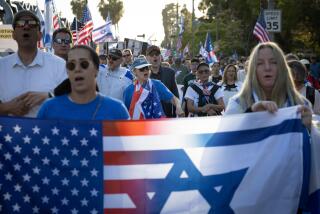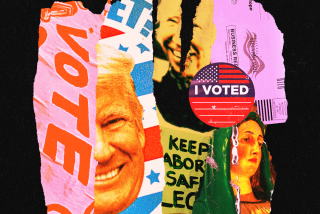Study finds God a daily force for most U.S. Latinos
For most Latinos in the United States, God is an active force in daily life, according to a major study released this week.
According to the study of Latinos and faith by the Pew Hispanic Center and the Pew Forum on Religion & Public Life, 68% are Roman Catholic, 15% are evangelical or born-again Christians, 5% are mainline Protestants, 3% belong to other Christian denominations and about 8% are secular. Less than 1% of the Latino population identify with Judaism or other non-Christian faiths, the researchers said.
The report’s main conclusion -- that Latinos and their embrace of charismatic styles of worship are reshaping the nation’s religious landscape -- garnered the most attention when the document was released Wednesday. But the study also took a close look at how Latinos practice their faith.
The report says that regardless of religious tradition, most Latinos pray every day, most have a crucifix or other religious object in their homes and most attend religious services at least once a month. Those figures are somewhat higher than for non-Latinos, the researchers found.
About 68% of Latino Catholics surveyed, for example, said religion is very important to them, with about 65% of Latinos who were mainline Protestants making the same statement. For Latino evangelicals, the figure was 85%.
Nearly 7 in 10 Latinos said they pray every day, with daily prayer even more common among evangelicals (87%) than among mainline Protestants (76%) or Catholics (64%).
The analysis, “Changing Faiths: Latinos and the Transformation of American Religion,” was based on several telephone surveys in which more than 4,000 adult Latinos participated. The margin of error was plus or minus 2.5 percentage points.
Among Latinos who identify with a religion, 3 in 4 agreed with the statement that “miracles still occur today, as in ancient times.” That belief was held by significant majorities of Latino evangelicals, Catholics and mainline Protestants, the study showed.
Regardless of religious tradition, the study also found that 73% of Latinos subscribe to a view the researchers described as “the prosperity gospel,” the belief that God will reward the faithful with health and prosperity. And more than half of Latinos said they believe that Jesus “will return to Earth within my lifetime.” That belief was most common among Latino evangelicals (60%) but also strong among Catholics (51%), the study showed.
Roberto Suro, director of the Washington, D.C.-based Pew Hispanic Center, said the data produced by the phone interviews were so extensive that the 86-page report released Wednesday represented just the “first cut” of the research. There’s a lot “more that can be found out from this data,” he said.
The report is available online at pewhispanic.org/
Celebrating faiths
About 300 people are expected to take part today in an all-day interfaith conference sponsored by the Southern California chapter of the Council for a Parliament of the World’s Religions.
The event, scheduled to run from 9 a.m. to 8:30 p.m., will be held at Masjid Omar ibn Al-Khattab, a mosque near Exposition Park in Los Angeles, and is open to the public, organizers said.
The first major event sponsored by the council’s local chapter, the conference will feature panel discussions, dialogue sessions and workshops around the topic “The Challenge of Respect: Celebrating Interfaith Commonality, Exploring Religious Differences.”
Joseph Prabhu, a professor of philosophy and religion at Cal State L.A., is the main organizer of the conference. Unlike some such events, he said, this one is likely to delve as much into areas of difference as areas of similarity between various faith traditions.
“I see exploring the differences as crucial to our understanding,” Prabhu said. “It’s out of that respect for difference that commonality and tolerance can grow.”
Conference participants are expected to include a number of local veterans of interfaith efforts, among them the Rev. Gwynne Guibord of the Episcopal Diocese of Los Angeles; Salam Al-Marayati of the Muslim Public Affairs Council; Rabbi Steve Jacobs, formerly of Temple Kol Tikvah in Woodland Hills; and Prabhu. Representatives of most major faith traditions will take part, he said, including Jews, Muslims, Christians, Hindus, Sikhs and Buddhists.
The scheduled afternoon workshops include sessions on such topics as religion and the environment, nonviolent conflict resolution, science and spirituality, and the power of prayer.
The Council for a Parliament of the World’s Religions began in Chicago in 1988 as an effort to commemorate the 1893 World’s Parliament of Religions, which was held in that city. The council’s last major conference, in Barcelona in 2004, drew more than 9,000 participants from 75 countries. Its next international convention is scheduled for Melbourne, Australia, in 2009.
Masjid Omar is at 1025 Exposition Blvd. A $36 registration fee will be charged at the door.
A Jewish merger
Two long-existing Jewish educational institutions in Southern California are proceeding with plans to merge, creating a single entity that will be called the American Jewish University.
Joining forces are the University of Judaism, an independent Westside school of about 300 undergraduate and graduate students, and the Brandeis-Bardin Institute of Simi Valley, an educational outreach center that offers summer and weekend arts, academic and outdoor programs for Jewish children and adults.
The merger “will dramatically increase the ability of both institutions to serve the Jewish community,” Linda Volpert Gross, who chairs the board of Brandeis-Bardin, said in a statement.
Robert Wexler, president of the University of Judaism, will become chief executive of the new university, officials said. Peter Lowy, chief executive of U.S. operations for the Westfield Group, who has been chairman of the University of Judaism board, will head the new joint board.
The University of Judaism was founded in 1947 and, in addition to other sites in its early years, was housed for a time at Sinai Temple. It moved to its current campus in Bel-Air in 1979. In addition to its undergraduate and master’s programs, it has a school of rabbinic studies and for the last five years has played host to a well-known lecture series.
The Brandeis-Bardin Institute was founded in 1941 in Hancock, N.Y., by former Supreme Court Justice Louis Brandeis and educator Shlomo Bardin. In 1947, it moved to its current home on about 3,000 acres near Simi Valley.
The new university will continue to offer classes and programming at both sites, spokesman Brian Yaeger said.
*
(BEGIN TEXT OF INFOBOX)
U.S. Latinos’ religious beliefs
Latinos identifying with a religion who say they believe that:
*--* Mainline All Catholics Evangelicals Protestants Miracles still occur today 75% 74% 84% 73% God grants health and wealth to the faithful 73 73 76 73 Jesus will return in my 52 51 60 36 lifetime*
*--*
* Asked of Christians only
--
Note: From a telephone survey of 4,016 Latino adults between Aug. 10 and Oct. 4, 2006. The margin of sampling error for the entire sample is +/- 2.5 percentage points.
--
Sources: Pew Hispanic Center, Pew Forum on Religion and Public Life
More to Read
Sign up for Essential California
The most important California stories and recommendations in your inbox every morning.
You may occasionally receive promotional content from the Los Angeles Times.










